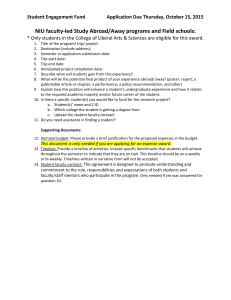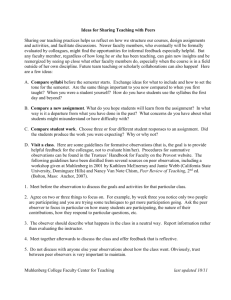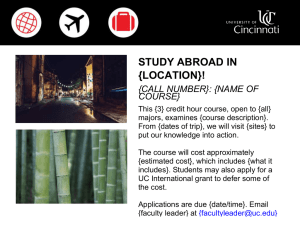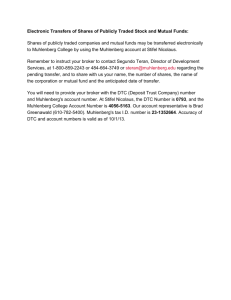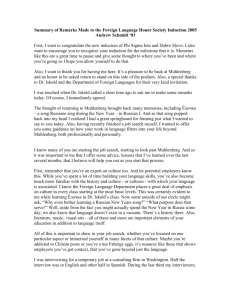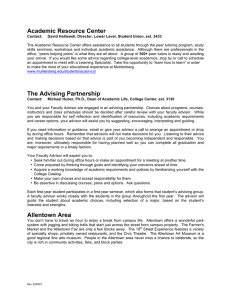Luba Iskold, Ed. D. NEALLT 2015
advertisement
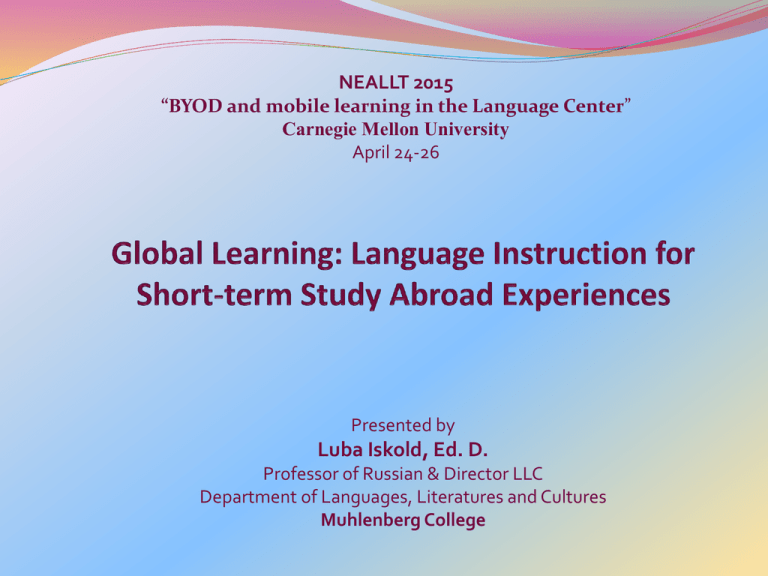
NEALLT 2015 “BYOD and mobile learning in the Language Center” Carnegie Mellon University April 24-26 Presented by Luba Iskold, Ed. D. Professor of Russian & Director LLC Department of Languages, Literatures and Cultures Muhlenberg College Presentation Outline Introduction & Background What is a MILA Experience? Purpose of the Study Research Questions Methodology Thinking through the Muhlenberg Model Discussion 2 Global Learning: What is a MILA Experience? Muhlenberg Integrated Learning Abroad Provides students with the opportunity to participate in courses that include short-term international study components Interdisciplinary courses taught by two professors Meet on campus during the fall or spring semester Include a faculty-led short-term study abroad trip after the close of the semester 3 Past Faculty Led Short-Term Programs Abroad 2014 Examples Ghana: History, Memory, and Performance in Ghana Study trip and Spring Semester course with Drs. Peck, Theatre & Dance Department and Gallon, History Department. Greece: Homeric Epic and Greek History Study trip and Spring Semester course with Dr. Randy Helm, President-Muhlenberg College. Trip included 10 days of site visits and fieldwork in Greece. Bangladesh: Climate Change/Sustainable Development in Bangladesh. Study trip and Spring Semester course with Drs. Hashim & Gambino, Political Science Department. 4 Project Description Purpose of the Study: • Examine the need for a language component in MILA courses • Develop a cost-effective institutional model for learning the basics of modern languages that are not offered as traditional language courses at the College Concern: The program would NOT replace the current Foreign Language Requirement, nor would it count toward the FL Requirement 5 Research Questions What are the institutional needs? Is language important? Are there institutional resources in place? How to assure student accountability? ? What are the instruments for student reward 6 Research Team The study was conducted with the support of a Faculty Center for Teaching Small Group Grant Three faculty & two students participated • Faculty: History, Political Science, Languages • Students: Idil (French, Turkish- heritage language) Sarah: Spanish & Russian (heritage languages) 7 Participants • 15 Muhlenberg Students who recently participated in a MILA course followed by faculty-led short-term summer program in Turkey • 18 Muhlenberg Faculty who recently participated in a faculty-led summer program in Turkey 8 Methodology • Convened two Focus Groups to survey perceptions of the need for basic language instruction in Turkish • Group I –Students • Group II- Faculty • Reviewed relevant literature • Researched institutions that offer less commonly taught languages • Consulted with department chairs and the Registrar 9 Summary of the Findings When adults go abroad and do not understand basic signs, directions, or communicative phrases, they become frustrated Those who know at least the basics can connect in more meaningful ways to other cultures Based on the findings from interviews conducted in the Fall of 2012 with faculty and students who traveled to Turkey in the Summer of 2012, we have established that our students will benefit from learning the basics of a language prior to going on a short- or long-term study abroad 10 Proposed Model: BLIC Basic Language for Intercultural Communication Hybrid program (combination of software, online resources, faceto-face communication with native speakers of the target language Flipped format Guided self- study of the basics of modern foreign languages that are not offered as traditional language courses at the College BLIC becomes a required component of a MILA course Students receive .5 credit for this component of the course The program would NOT replace the current Foreign Language Requirement, nor would it count toward the FL Requirement 11 Basic Language for Intercultural Communication In collaboration with an interested faculty/department, the Language Learning Center will prepare a language study kit, including: syllabus/course of study outline software & online materials self-assessment tools for basic Turkish Faculty in the Political Science and History Departments will identify and recruit peer- and/or community partners, native speakers of Turkish, who will conduct face-to-face conversation sessions with students The LLC will train peer- and community partners in language learning strategies and will provide other relevant information Online facilitators for those preparing to travel abroad ??? 12 Discussion Assessment Tools: Objective Testing : CEFR objective Tests??? Self-reported: CEFR Rubrics Facilitation: Face-to-Face??? Online??? 13 Contact Information: Dr. Luba Iskold 2400 Chew Street Muhlenberg College, Department of Languages, Literatures and Cultures, Allentown, PA 18104 Phone: 484-664-3516 Fax: 484-664-3722 E-mail: iskold@muhlenberg.edu http://www.muhlenberg.edu/depts/forlang/LLC/iskold_home/index.htm 14
